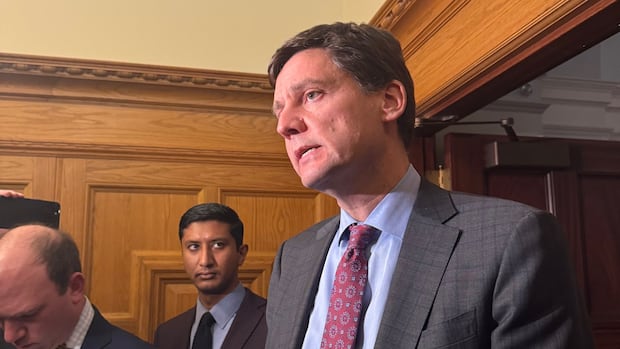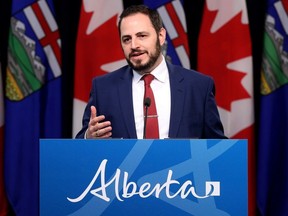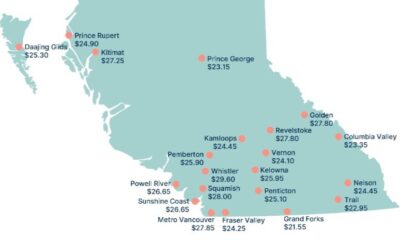Top Stories
B.C. Premier Eby Slams Secret Pipeline Talks with Ottawa, Alberta

UPDATE: British Columbia Premier David Eby has issued a fierce condemnation of Saskatchewan Premier Scott Moe over claims of “secret conversations” involving Ottawa and Alberta regarding a controversial oil pipeline proposal. Eby expressed shock during an interview with CBC’s Power & Politics, stating, “I almost fell out of my seat when I heard Scott Moe say that he was part of these conversations.”
This urgent development raises significant concerns for residents of British Columbia, as discussions reportedly inch closer to a memorandum of understanding that could pave the way for a new oil pipeline to the B.C. North Coast. A senior government official disclosed that the federal and Alberta governments are nearing an agreement that might permit tanker traffic in this sensitive region.
Eby emphasized the potential ramifications of such a proposal, calling it a “broadside attack” on the existing oil tanker ban that he argues is foundational for the province’s economic stability. “These discussions, which I was completely unaware of… about what happens in British Columbia, are alarming,” he added.
“Rolling back the tanker moratorium would jeopardize billions in coastal economic activity,” Eby warned.
The current ban, which restricts oil tankers in B.C. waters from carrying more than 12,500 metric tons of crude oil, is pivotal for many communities, especially Indigenous groups like the Heiltsuk Nation. Eby noted that the foundation of support for major resource projects in B.C. relies on this ban, stating, “The vast majority of those projects rely on the support of coastal First Nations.”
As tensions escalate, Alberta Premier Danielle Smith has accused Eby of being “un-Canadian.” In response, Eby criticized Smith’s claims as unrealistic, asserting that the pipeline lacks necessary approval, funding, and public support. “This isn’t happening,” he said, dismissing the pipeline plan as unviable.
Amid these developments, the implications of a potential exemption to the oil tanker ban are significant. Eby illustrated this concern with a striking analogy: “Carving out exemptions to a tanker ban is like explaining to a vegetarian that they’ll still be a vegetarian if they eat a few steaks.” This comment underscores the deep-rooted opposition many feel towards any changes that could threaten environmental protections.
The urgency of this situation is compounded by ongoing environmental concerns. The Heiltsuk Nation has expressed that the timing of these talks could not be worse, emphasizing that “a ban is not a ban if it includes exceptions.”
Meanwhile, the opposition in B.C. has criticized Eby for his stance. John Rustad, leader of the Official Opposition, claims the premier is “fear-mongering,” arguing that he has spoken with First Nations interested in participating in energy projects. Rustad insists that Eby’s refusal to engage in discussions about the pipeline reflects a lack of national vision.
As the debate intensifies, Eby insists that B.C. is focused on maximizing the capacity of the existing taxpayer-owned Trans Mountain pipeline, which recently commenced operations at 80 to 85 percent of its capacity. The $34 billion expansion project, which began transporting oil from Edmonton to Vancouver in May 2024, is now a pivotal point in the province’s energy strategy.
What happens next remains to be seen, but the stakes are high. As discussions progress behind closed doors, the residents of B.C. and the broader Canadian public are left to grapple with the potential consequences of these secretive negotiations.
Stay tuned as this developing story unfolds.
-

 Politics2 weeks ago
Politics2 weeks agoSecwepemc First Nation Seeks Aboriginal Title Over Kamloops Area
-

 World4 months ago
World4 months agoScientists Unearth Ancient Antarctic Ice to Unlock Climate Secrets
-

 Entertainment4 months ago
Entertainment4 months agoTrump and McCormick to Announce $70 Billion Energy Investments
-

 Lifestyle4 months ago
Lifestyle4 months agoTransLink Launches Food Truck Program to Boost Revenue in Vancouver
-

 Science4 months ago
Science4 months agoFour Astronauts Return to Earth After International Space Station Mission
-

 Technology3 months ago
Technology3 months agoApple Notes Enhances Functionality with Markdown Support in macOS 26
-

 Top Stories1 month ago
Top Stories1 month agoUrgent Update: Fatal Crash on Highway 99 Claims Life of Pitt Meadows Man
-

 Sports4 months ago
Sports4 months agoSearch Underway for Missing Hunter Amid Hokkaido Bear Emergency
-

 Politics3 months ago
Politics3 months agoUkrainian Tennis Star Elina Svitolina Faces Death Threats Online
-

 Politics4 months ago
Politics4 months agoCarney Engages First Nations Leaders at Development Law Summit
-

 Lifestyle2 months ago
Lifestyle2 months agoManitoba’s Burger Champion Shines Again Amid Dining Innovations
-

 Technology4 months ago
Technology4 months agoFrosthaven Launches Early Access on July 31, 2025




















